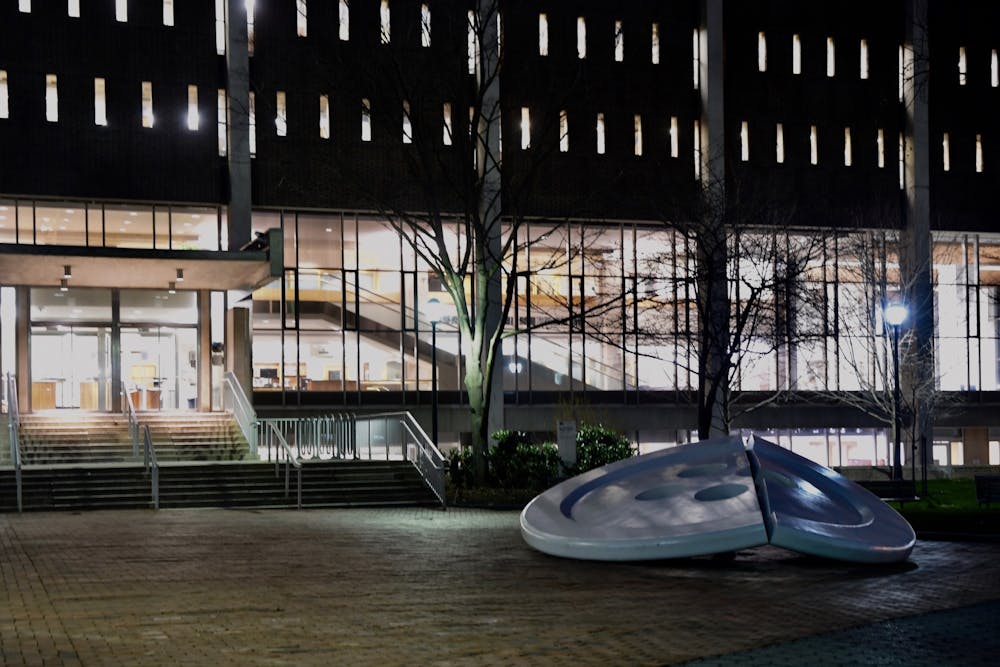
The Van Pelt Library at night. The library will be reopening to students at limited capacity on Tuesday.
Credit: Sukhmani KaurVan Pelt Library is scheduled to reopen to students at limited capacity on Tuesday under a seat reservation system.
All current students can reserve one of 48 available study spaces on the ground floor of Van Pelt for between one and three hours. The library will be open from 11 a.m. to 7 p.m. Mondays through Thursdays, and 12 p.m. to 5 p.m. on Fridays.
The web-based scheduling system launched on Jan. 29 in anticipation of the library's opening after the conclusion of the Quiet Period Feb. 1. Due to the suspension of on-campus operations Monday, the library will not open until Tuesday at the earliest.
Students must reserve their seat at least 12 hours ahead of their chosen time slot. All patrons must comply with Penn's COVID-19 testing protocols, show a confirmed reservation, and show a green PennOpen Pass in order to enter the library.
The first study spaces to open will include 25 seats in the Rosengarten Quiet Study Area, 19 seats in the Goldstein Undergraduate Study Center, and four individual study rooms. These study spaces include Van Pelt’s carrels, which Associate Vice Provost and Deputy University Librarian Jon Shaw described as “your own mini office in an open space.” The carrels are desks with partitions, and each is equipped with power outlets.
All visitors will be required to follow safety procedures including wearing face coverings and adhering to social distancing requirements. Visitors must also wipe down their workspace after use. No food or drink is permitted, including water.
To make sure that students are following the safety precautions, wellness ambassadors from Penn Athletics will be present at the library to enforce the Student Campus Compact, Shaw said.
Contact-free printing, free of cost, as well as restrooms are available for anyone with a reserved seat. Each patron must stay in their assigned seat except when using the restroom or printer, according to Penn Libraries’ policies and procedures regarding seat reservations.
No public access to book stacks will be granted, and library computers, chargers, scanners, or other technological equipment will not be available with the exception of equipment in the Butler Assistive Technology Room.
“A lot of people talk about the new normal, and in our mind, this is kind of the semblance of return to normal,” Shaw said. “What we're trying to do is provide a stimulating environment so that students can really do the work that they have always done for the past couple hundred years in the library.”
During the Quiet Period, students were only permitted to leave their campus residences for limited, essential movement, which led many students to complete all of their school work in their dorm rooms.
College first-year Emiliano Castillo said he is looking forward to working in a space designated for studying because it has been difficult to be productive in his room, as it is the same space he uses for eating, sleeping, and talking to friends.
“I feel like if I'm in a space where everyone else is being productive around me, I'm going to be forced into this more productive mentality,” Castillo said.
College first-year Joy Olatunde also said she has had a difficult time studying in her dorm room.
“Studying in my room is really dreary. My bed, right there, is so tempting," Olatunde said. "Whenever I say ‘okay, I'm going to do this reading on my bed,’ that has never been a successful statement.”
Castillo and Olatunde both said they plan to use the library regularly to study and complete their school work.
“I think that going to a library and being in a study setting, like seeing people study alongside me, will help me focus more and just be more productive,” Olatunde said.
If University health guidelines allow, Shaw said Penn Libraries may open more study spaces to meet the demand among students.
“It is heartening as a librarian to know that students crave to study in our spaces, and are looking forward to using our spaces,” Shaw said.
The Daily Pennsylvanian is an independent, student-run newspaper. Please consider making a donation to support the coverage that shapes the University. Your generosity ensures a future of strong journalism at Penn.
Donate







